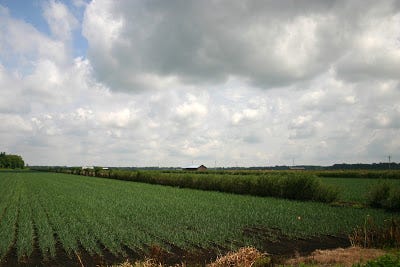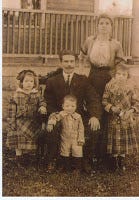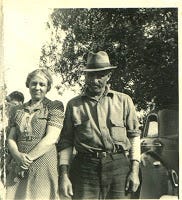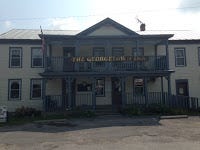Who I Am: A Journey From Heartland to Foggy Bottom
Blue collar roots, white collar dreams. Rural America occupies my heart and soul.
A detractor of one of my recent posts insinuated that I was an elitist “Republican” country clubber. This person has never met me, but inferred things about me that are flat-out untrue. It gave me a laugh. There are popular stereotypes of diplomats as being born with silver spoons in their mouths, Ivy league elitists who sashay in their dinner jackets and cocktail gowns, idling their time at polo matches and fancy soirees. Modern U.S. diplomats come from a wide variety of backgrounds and the Department of State strives to make the Foreign Service more diverse, reflecting the changes in American society. By nature a very private individual, I herewith reveal a little about my family background. (Note in the old photos none of my grandparents are in tails or gowns.)
My grandparents on both sides were farmers, immigrants from Italy. My parents grew up working on their family farms. My grandmother went into labor while plowing in the field, delivering my father shortly afterward. She was totally illiterate and never learned English. The country doctor who subsequently arrived to check up on them was drunk and failed to record the birth date. To his dying day, my father was unsure of the exact date of his birth. To make matters worse, all county records perished when the county court house burned down some time in the ‘30s. The county seat has never exceeded 500 in population. When America entered WWII, the draft board overlooked my father simply because there was no official record of his existence. He eventually filled out paperwork to rectify that problem. My father wasn’t able to complete high school. I was the first male in my family to both finish high school and go on to university.
My mother was born in the dead of winter. Her family doctor misspelled her name on her birth certificate. Hence, she was stuck her entire life with the name “Caterine.” Both of my parents had to walk several miles each day to and from school. In winter, they sometimes managed to hitch a ride on a horse-drawn sleigh. They told us how some of their teachers used rubber hoses or batons to beat misbehaving pupils. My mother told stories about goofing off with her pals while hauling milk cans to the dairy. My father bore a scar on his forehead from a cow who’d kicked him in the head when he tried to milk her, his hands apparently too cold. My parents told of the discomfort of having to defecate in drafty outhouses in winter, using only corn cobs and, if lucky, torn-up newspapers in lieu of toilet paper. They did their homework by kerosene lamps. Sometimes, food was short and they had to nourish themselves with bread and wild grapes. It was the depression. Times indeed were tough.
My mother worked for the Navy Department in D.C. during WWII. When she returned home, she and my father dated. The rest is history. They left their farms. Along came three kids. On summer Sundays they would often pack us kids into the car to return to the fields to inspect the crops, offering detailed insights on which families were doing okay and which were struggling based on the height and appearance of the corn, onions, celery, peas and so forth.
My father and his brother (who married my mother’s sister) bought a drab old lodge called “The Georgetown Inn” in a hamlet numbering around 900 souls. On weekends, farmers and trappers congregated there for beers and square dancing. In order to get them to drink more, my wily uncle jacked up the heat and closed the windows and had my mother and aunt dance with the male clientele. Perspiration flowed; deodorant wasn’t widely used in those days. Moreover, many of the customers, still clad in their work gear, reeked of manure on their boots. As the night wore on, the atmosphere at the Georgetown Inn became toxic. But the guys indeed drank more, upping profits.
My father and uncle subsequently developed other businesses. In contrast to their upbringing, we kids enjoyed a comfortable middle class life, replete with electricity and indoor plumbing. But we all did farm work at various times, including baling hay, picking corn and onions. Our ancestral farmlands, alas, have reverted to wilderness as the region has depopulated over the years.
Our elementary school had five classrooms. The teachers sometimes paddled us boys. The principal at my middle school beat my left palm with a flattened club until it was numb. Infraction: throwing snowballs in the school yard. Learning was largely by rote. School, for me, was a mind-numbing experience — except when I dated the county dairy princess. And, yes, we had guns. Hunting and fishing were favorite pastimes. Others were swimming in watering holes and cow troughs. When dinner time rolled around, our mothers rang cow bells for us to return home. Each bell had a distinctive ring, so we knew whose mom was summoning her kids.
I loved the great outdoors — hiking, camping, hunting and fishing. I especially enjoyed extended canoeing expeditions in the wilderness 200 miles north of Montreal where the occasional human would be a French-speaking Algonquin Indian.
Throughout my teens and college years, I worked on construction. I also laid track on the county rails, using the same tools and technology that Abe Lincoln did. I recall a particularly arduous half-year building a sewage system for a shopping center. We worked right into January (during my winter break) in sub-freezing temperatures. I dug trenches, operated heavy equipment and handled and cut asbestos drainage pipes. The best workers were Mohawk Indians. I was in awe of those guys. They hardly ever took breaks. This is what I did during my college vacations while the other kids bummed around Europe or took up unpaid internships. I read Foreign Affairs Magazine in a dump truck during my lunch hour. My hard hat from those days today hangs on a wall in my house.
I managed to get into good universities and ultimately realized my dream of becoming a U.S. Foreign Service officer. To this day, people do a double-take when they hear about my journey. I got to visit many countries, learn about other cultures, and, yes, attend glittery social events, occasionally in a tux! I dined at the White House and got to meet heads of state, prominent politicians as well as artists and scholars. I even served in a Secret Service protective detail for President Clinton. Most importantly, I had to exercise my brain to its fullest in a highly demanding career. It sure beat baling hay.
But my family members and I remain true to our roots. My wife, of Dutch farmer stock and formerly a World Bank official, and I eschew tux and gown and belong to no country club, though we’ve been invited to join. Our oldest daughter worked in a pumpkin patch and on livestock farms; among her duties was milking sheep before dawn. Her sister sold baked goods in a local farmers market. Both belonged to 4-H. My illiterate grandmother had no concept of what I did for a living, but I am grateful for what she, my other grandparents and my parents endured to make my dream possible. And when dinner time rolls around, I can still hear the distinctive peal of my mother’s cow bell.







